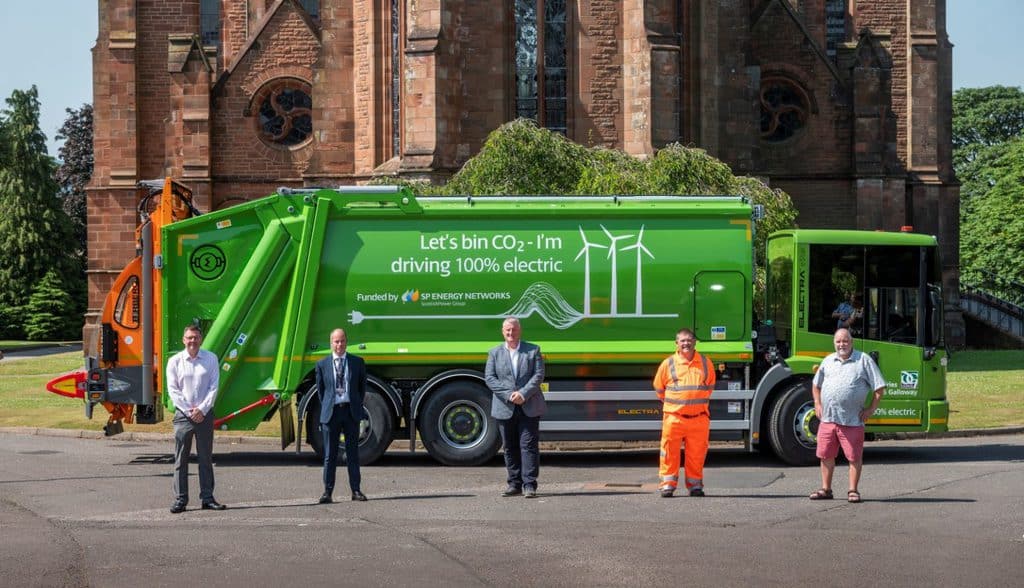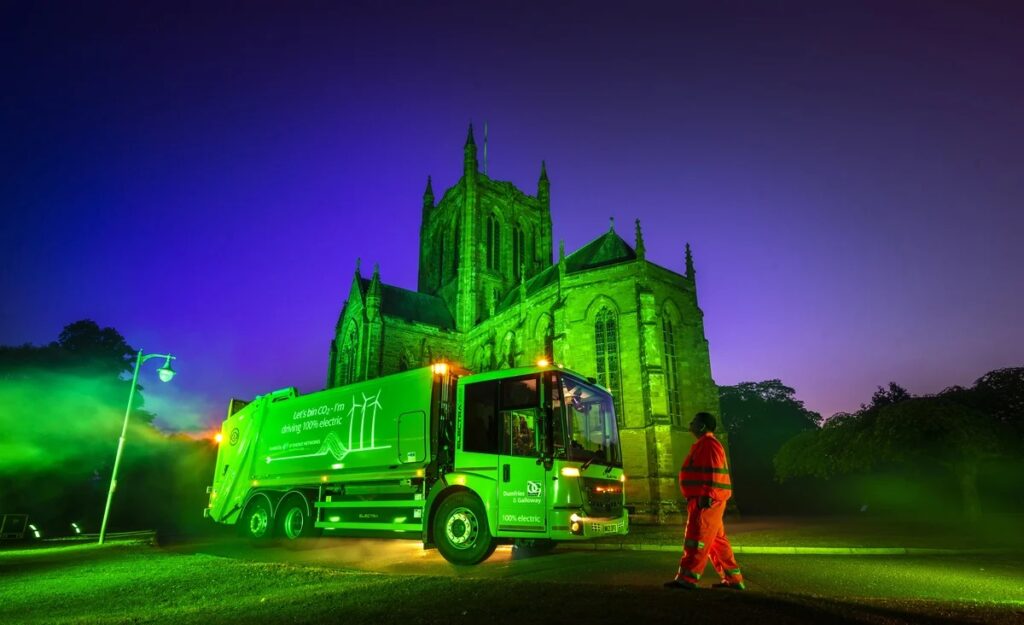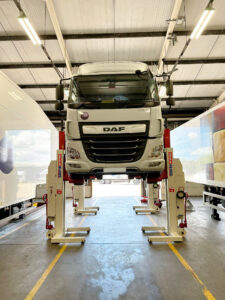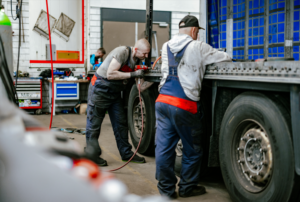SP Energy Networks and Dumfries & Galloway Council are piloting the UK’s first two Electra fully electric refuse collection vehicles (RCVs) for rural applications.
The two new RCVs have been manufactured by Electra Commercial Vehicles in Blackburn and are funded as part of SP Energy Networks’ £20 million Green Economic Fund, representing an investment of £1.04 million together.
First electric RCVs to be used in the countryside
The brand-new electric RCVs are Scotland and the UK’s first to be trialled in a rural area. The Council will introduce them onto routes serving local communities across Dumfries and Stranraer, the two largest towns in Dumfries and Galloway. Using the vehicles to collect waste is part of reducing carbon emissions and improving air quality across the region, with the added benefit of reducing noise pollution in residential neighbourhoods.
Specifications
The new electric vehicles encompass a battery size of 287KW, giving them a range of approximately 100 miles over 12 hours of operation, enabling refuse operators to execute 1,500 bin lifts.
The Electra e-Star LEM 27 comes with a 6×2 rigid chassis and a Day Cab and weigh 27-tonnes with a 287 KWh Power Pack. Built on Low Entry Mercedes-Benz (LEM) Econic glider chassis, the body is from Dennis Eagle with a Terberg Matec Omnidel bin lift on the rear.
Electra’s progression
Ben Smith, MD of Electra Commercial Vehicles, commented: ‘The trials mark a significant move for Electra. We are confident to demonstrate that electric HGVs are as suitable for use in the countryside as they are in an urban environment.
‘Our technology has already been proven to work with our clients in the City of London and Manchester. Soon, we will be able to demonstrate that we can also help rural councils improve air quality, reduce emissions and reach net-zero with no compromise on diesel performance.’
Big changes
SP Energy Networks CEO, Frank Mitchell, said: ‘Dumfries & Galloway has ambitious plans to achieve Net Zero emissions by 2025. However, for that to happen, there will need to be big changes. Introducing the two new electric refuse vehicles is a sign of what’s to come in all our towns and cities eventually. Not only will they reduce carbon emissions and improve air quality, but they’re also a statement of intent and provide a blueprint for similar technology that we will roll out across the region.
‘We’re proud to be supporting Dumfries & Galloway Council in its bold 2025 net-zero journey and helping to improve the lives of people in the communities we serve. By funding the first rural fleet of completely electric refuse vehicles, we’re determined that no community will be left behind in the journey to net-zero emissions, and this is just one of many ways we’re enabling that change.’
Adressing the climate emergency
Cllr John Martin, Vice-Chair, Communities Committee at Dumfries and Galloway Council, said: ‘Dumfries & Galloway has declared a climate emergency and set out bold targets to have net zero emissions by 2025. To achieve that, we need creative solutions specifically tailored to the local challenges faced by rural communities. The launch of these electric refuge vehicles shows our intent to roll out electric transport solutions across public services in years to come.
‘The generous grant from SP Energy Network’s Green Economy Fund has enabled us to commission two electric refuse vehicles for use in rural communities across the region. As a leader in the UK’s transition to net zero, Dumfries & Galloway is in a strong position to pilot green technology that has the potential to transform public services to be greener and cleaner in future years.’
Transition to electric vehicles
The Green Economy Fund contributes to the Scottish Government’s ambitious plans to meet climate change targets, boost local economic growth, improve air quality across the country and deliver a better future quicker for local communities. We’re committed to providing the infrastructure needed for Scotland to transition to electric vehicles.
So far, 35 projects have been awarded funding across Central and Southern Scotland.
For more information, visit www.electracommercialvehicles.com/

NRG and RTR deliver the first Electra RCV in the South West to MJ Church




